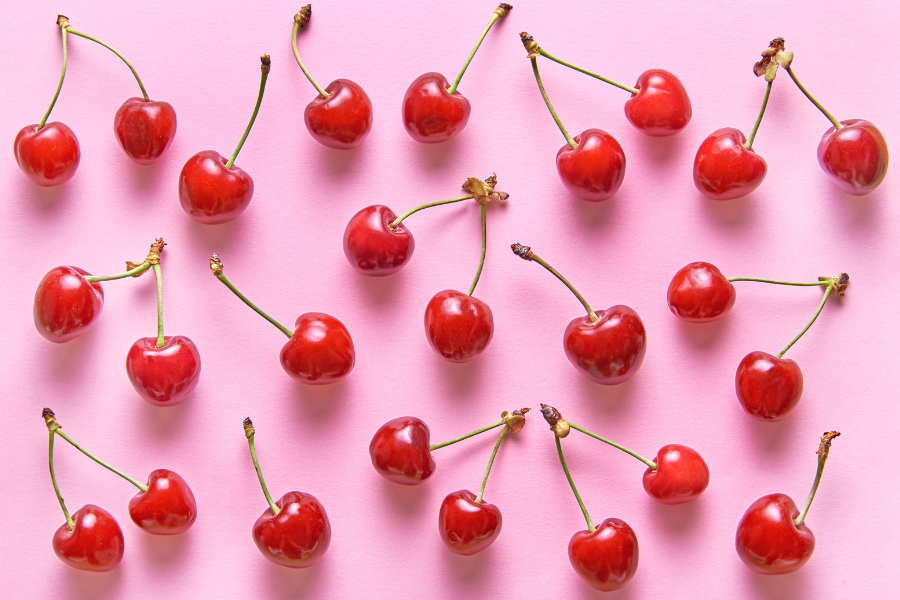Introduction
If you've ever been chowing down on a big bowl of cherries next to your dog and wondered "can I share on of these with Rocco?", you're not alone. Many dog owners have the same question - "Can dogs have cherries?" We are here to settle this debate once and for all, and it is an important debate at that. Some human foods are perfectly safe for dogs, while others can be harmful or even deadly, so it is important to know the difference. In this blog we are going to be doing a deep dive, exploring all the details of feeding cherries to dogs so that you can make an informed decision.
Can Dogs Eat Cherries? The Short Answer
For those of you who don't want all the details, or simply don't have time to read this entire blog, we will cut to the the chase quickly. The short answer is that it is both a yes and no. The flesh of the cherry itself is okay and non-toxic for dogs, but there are several other risk factors to consider when doing this. The pits and the stems can both are toxic for dogs, as they can contain cyanide, which is poisonous for dogs.
The Flesh Debate
While the nutrient-dense fruiting body (which we are calling the flesh) of the cherry can carry some health benefits, they don't trump the potential risks of feeding your dog cherries. If you do decide you're doin' it anyway, and want to share a couple cherries with your dogs, moderation is key, and make sure it is only the flesh - no stems or pits.
The Pit of The Problem
Cyanogenic glycosides can be contained in cherries (which then can release cyanide when chewed or digested.) Cyanide is a highly toxic substance for dogs and should be avoided at all costs. The pit of a cherry can also be a choking hazard for dogs (particularly for smaller dogs). This is why we recommend not risking it at all, but at a minimum the pits should be removed before you offer a cherry to your dog.
Stems and Leaves The Hidden Dangers
Unfortunately, it's not just the pits you have to look out for. The stems of cherries also contain those pesky cyonegenic glycosides, and therefore the stems can be just as dangerous as the pits!
Nutritional Benefits of Cherries for Dogs
Though risky (for all the reasons we have mentioned above), cherries do offer quite a few nutritional benefits, that could contribute to both your health and your dog's.
Vitamins Galore
Cherries are rich in vitamins A and C, both of which are crucial for maintaining a healthy immune system. Vitamin A also supports eye health, while vitamin C aids in collagen production and antioxidant protection.
Fiber for Digestion
The fiber content in cherries can help regulate your dog's digestive system. However, too many cherries can lead to digestive upset, so moderation is essential.
Antioxidants for Longevity
Cherries are known for their high antioxidant content, which can help combat oxidative stress and inflammation. These benefits can contribute to a healthier, longer life for your dog.
The Risks of Feeding Cherries to Dogs
While cherries do have some health benefits, the risks often outweigh the rewards.
Cyanide Poisoning
The most significant risk is cyanide poisoning from the pits, stems, and leaves. Symptoms can include difficulty breathing, dilated pupils, and red gums. Immediate veterinary attention is required if you suspect cyanide poisoning.
Choking Hazards
Cherry pits pose as choking hazards, especially for smaller dogs. Even if the pit passes through the digestive system, it can cause blockages that require surgical intervention.
Digestive Upset
Too many cherries can lead to gastrointestinal issues like diarrhea and stomach cramps. It's essential to introduce cherries slowly and in moderation to avoid these problems.
Alternatives to Cherries
If the risks associated with cherries are too high for your comfort (they are too risky for us to feed to our dog!), there are plenty of safer alternatives that offer similar nutritional benefits.
What to Do if Your Dog Eats a Cherry Pit
Accidents happen, and if your dog manages to eat a cherry pit, immediate action is required.
Recognize the Symptoms
Look out for symptoms like difficulty breathing, dilated pupils, or excessive drooling. These could indicate cyanide poisoning and require urgent veterinary care.
Contact Your Vet
Call your veterinarian immediately if you suspect your dog has ingested a cherry pit. They may recommend bringing your dog in for an examination or inducing vomiting at home.
Monitor Closely
Keep a close watch on your dog for the next 24-48 hours for any signs of discomfort or distress. Quick action can often prevent severe complications.
Common Myths About Dogs and Cherries
There are several myths floating around about dogs and cherries. Let's debunk a few of them.
Myth 1 Cherries Are Always Safe in Small Amounts
While the flesh of the cherry is generally safe, the pits, stems, and leaves are not. Even a small amount can be dangerous.
Myth 2 All Dogs Can Eat Cherries
Every dog is different. Some may tolerate cherries well, while others might have allergic reactions or digestive issues.
Myth 3 Other Fruits Are Just as Dangerous
While some fruits like grapes and raisins are toxic to dogs, many others like apples and blueberries are generally safe when prepared correctly.
Expert Opinions on Dogs Eating Cherries
For the most part, veterinarians and pet nutritionists (yes, there are pet nutritionists) will tell you not to feel cherries to dogs due to the risks involved.
FAQs About Dogs and Cherries
What About Maraschino Cherries?
No, they should not. Maraschino cherries have too much sugar and often contain preservatives.
Are Dried Cherries Safe?
Again, too much in dried sugar! And preservatives. So no go on dried cherries for dogs.
Can Puppies Have Cherries?
Definitely not. Puppies are often more sensitive than adult dogs, and more susceptible to risky foods than adults dogs are.
Conclusion
To summarize, while cherries are chalk full of antioxidants and can be a healthy fruit for humans to consume, they are risky for dogs to have. The pits and stems can contain cyanide, a known poison for dogs, and the pits also can be a choking hazard. If you are looking to share fruit with your dog, there are safer options (like blueberries).
If you are still chomping at the bit (pun intended) to feed your dog cherries, we encourage you to talk to your veterinarian first.
FAQ
Is Cherry Fruit Toxic to Dogs?
Alright, let's cut to the chase—yes, cherry fruit can be toxic to dogs, but it's not the juicy flesh that's the real problem. The real villains are the pits, stems, and leaves. These parts of the cherry contain cyanogenic glycosides, which break down into cyanide in the dog's system.
Can a Dog Eat Cherries with Skin?
The skin and the flesh of a cherry are typically ok for dogs, but only in moderation. There is still a risk, however, of some pit being attached to the skin or the flesh of a cherry, which could contain remnants of that poisonous substance cyanide.
What if My Dog Ate an Entire Bowl of Cherries?
If your dog got to the bowl of cherries before you did, you may be freaking out, and this is, well, it is completely understandable. But take a breath, and follow the steps below:
Immediate Steps to Take
- Assess the situation: How many cherries did your dog actually eat? And did they eat all the way through the cherries, including the pits? Knowing this info will help you gauge the risk level.
- Call your vet, and call them as soon as possible! Provide your vet with all the details of the situation. They will instruct you on the next best steps, whether that is driving immediately to your vet, or providing you with instructions to make your dog vomit (safely).
References
1) https://www.akc.org/expert-advice/nutrition/can-dogs-have-cherries/



